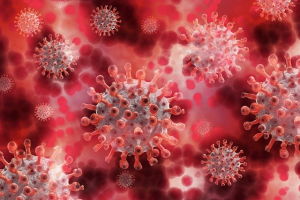Selenium is a natural trace element that has an important role in the functioning of the immune system (summarized in an earlier seleniumfacts.com article).

Individuals with low serum selenium concentrations, e.g. below 70 mcg/L, are at greater risk of contracting Covid-19 and at greater risk of a more severe outcome. Selenium supplementation may give therapeutic benefits. SARS-CoV-2 is a single-stranded RNA virus responsible for COVID-19 infections. Covid-19 infections have a complex metabolism that is comparable to RNA virus infections such as coxsackievirus, influenza virus, Hanta virus, and HIV virus infections.
- Selenium deficiency is associated with a higher susceptibility to RNA viral infections and with more severe disease outcomes [Hiffler 2020].
- Selenium deficiency is associated with increases in the mutation, replication, and virulence of RNA viruses [Hiffler 2020].
- There may be a protective effect of selenium supplementation against the susceptibility to and the severity of Covid-19 infections in selenium deficient individuals [Hiffler 2020].
Selenium Deficiency Promotes Mutations, Replication, and Increased Virulence of RNA Viruses
Selenium deficiency – frequently defined as serum selenium status below 70 mcg/L – increases the risk of infection with RNA viruses:
Coxsackie virus:
Beck and Levander have shown that a mild Coxsackie virus can become highly virulent in selenium deficient mice. Similarly, a normally mild strain of influenza virus, influenza A, also showed increased virulence when it was given to selenium-deficient mice. The increased virulence was accompanied by multiple changes in the viral genome in a segment that was previously thought to be relatively stable [Beck 2003].
Hanta virus:
Influenza virus:
During the 2009 swine flu pandemic, patients diagnosed with H1N1 pneumonia were found to be more selenium deficient than patients in a control group with influenza-like but non-H1N1 illnesses. Moreover, patients with H1N1 pneumonia who had blood selenium levels considered to be necessary for normal glutathione peroxidase activity – between 70 and 90 mcg/L – were seen to recover faster and to have a better survival rate than the H1N1 pneumonia patients with lower selenium blood levels [Moya 2013].
HIV virus:
Serum selenium status is associated with disease progression and mortality risk in HIV infections. Selenium supplementation of HIV-infected patients has shown therapeutic benefits in clinical trials [Baum 2013].
Covid-19:
Zhang et al. [2020] compared selenium status (using selenium status data from hair measurements) with recovery rates from COVID-19 in 17 Chinese cities. They found a highly significant correlation: the lower the selenium status in an area, the lower the recovery rate from COVID-19.
In the city of Enshi, a city in China with one the highest selenium intakes in the world, the recovery rate from COVID-19 was almost three times the average recovery rate for the rest of the cities in Hubei Province, including Wuhan [Zhang 2020].
Therapeutic Benefits of Selenium Supplementation
Selenium supplementation of individuals with low serum selenium status may be beneficial in terms of the restoration of the host cells’ antioxidant capacity, reduction of apoptosis, limiting of endothelial cell damages, and lessened platelet aggregation.
- Restoration of host cells’ antioxidant seleno-enzymes such as thioredoxin reductase and glutathione peroxidase that provide defense against oxidative damage [Rayman 2012].
- Restoration of the host cells’ stock of selenoproteins that contribute to immune system functioning and to anti-inflammatory effects [Rayman 2012].
- Inhibition of NFκB signaling – NFκB is the protein signaling complex that acts as a central mediator of the pro-inflammatory molecules involved in life-threatening cytokine storms in COVID-19 infections.
- Protection of the functioning of endothelial cells, reducing the risk of Covid-19 induced inflamed endothelial cells.
- Promotion of anti-thrombotic effects, protecting against the Covid-19 associated risk of arterial and deep-vein thrombosis, pulmonary embolism, and micro-vascular thrombosis.
Summary
Low serum selenium status is common in conditions – obesity, metabolic syndrome – that increase the risk of severe COVID-19 infections, especially in the elderly.
Supplementation of individuals with low serum selenium status can have preventive and therapeutic effects with regard to susceptibility to and severity of Covid-19 infection.
Sources
Baum MK, Campa A, Lai S, Sales Martinez S, Tsalaile L, Burns P, Farahani M, Li Y, van Widenfelt E, Page JB, Bussmann H, Fawzi WW, Moyo S, Makhema J, Thior I, Essex M, Marlink R. Effect of micronutrient supplementation on disease progression in asymptomatic, antiretroviral-naive, HIV-infected adults in Botswana: a randomized clinical trial. JAMA. 2013 Nov 27;310(20):2154-63.
Beck MA, Levander OA, Handy J. Selenium deficiency and viral infection. J Nutr. 2003;133:1463–7S.
Fang L-Q, Goeijenbier M, Zuo S-Q, Wang L-P, Liang S, Klein S, et al.
The Association between Hantavirus infection and selenium deficiency in Mainland China. Viruses. 2015;7:333-51.
Hiffler L, Rakotoambinina B. Selenium and RNA Virus Interactions: Potential Implications for SARS-CoV-2 Infection (COVID-19). Front Nutr. 2020 Sep;7:164.
Moya M, Bautista EG, Velázquez-González A, Vázquez-Gutiérrez F,
Tzintzun G, García-Arreola ME, et al. Potentially-toxic and essential
elements profile of AH1N1 patients in Mexico City. Sci Rep. 2013;3:1284.
Rayman MP. Selenium and human health. Lancet. (2012) 379:1256-
68.
Zhang J, Taylor EW, Bennett K, Saad R, Rayman MP. Association between regional selenium status and reported outcome of COVID-19 cases in China. Am J Clin Nutr. 2020;11:1297–9.
The information presented in this review article is not intended as medical advice and should not be used as such.
27 April 2021

